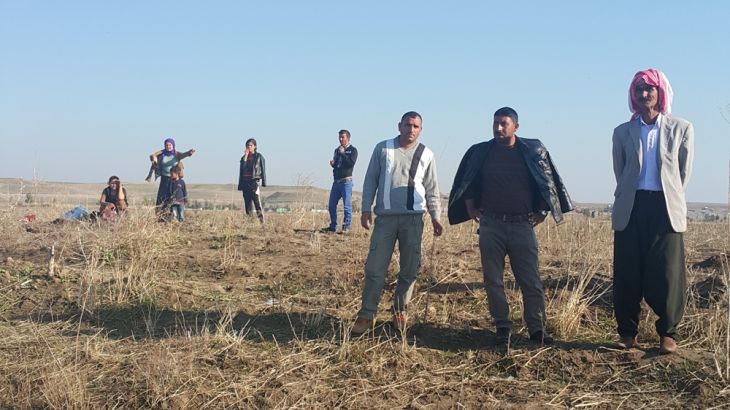No more waiting in vain for Iraq’s displaced Yazidis
Thousands of Yazidis hope their long wait to get back to hometown of Sinjar is over after Kurds take it back from ISIL.

Cars and vans stretch out across the road as far as the eye can see.
They remain parked on the side of the road. None of them move, yet, they remain pointed in the direction of Sinjar town – the place that was once home.
Keep reading
list of 4 itemsMoscow theatre attack suspects show signs of beating in court
Four men showing signs of severe beating charged over Moscow concert attack
Russia mourns Moscow concert hall attack victims as death toll rises to 137
Their occupants stand or sit in the fields on the side and wait.
They are Yazidis: followers of an ancient religion that some say is as old as the hills that surround them.
In August 2014, the Islamic State of Iraq and the Levant (ISIL) took the mountain.
The armed group saw them as heretics and gave them a choice: Convert to Islam or die.
According to the UN, they killed at least 3,000 Yazidi men and enslaved Yazidi women.
Whole communities were left on the mountain to starve. The world took notice, and the US hit targets in Iraq, and then, a month later, in Syria.
Finally, in December, an offensive was mounted to open up a corridor that allowed those trapped to flee from the north of the mountain.
Since then, they have been living in camps across northern Iraq dreaming of home.
‘Let us go back’
Sirim Aji squats on the ground.
His moustache should be white; instead, it is covered in grey with dirt.
Sirim’s three-year-old son plays next to him. He does not remember home, and for him, the camp, or the side of the road, are just one big playground. Life is far from playful for Sirim, however.
He says: “I have been sitting on this road for two days already. The Peshmerga do not let us through.
“I am from Sinjar. We have left the camp. They say it is not safe. We say to them: ‘Just let us go back.’ Anything is better than the camp.”
It is a common sentiment here.
Analysis: Is Sinjar the new Kobane?
The hundreds that line the road seem to be in two moods: angry or fed up. They want to go back.
Camp living has killed their spirit. These are mountain people, tough and proud. But what will they find when they go back home?
ISIL has likely booby-trapped buildings with explosives. There are equally likely to be car bombs scattered randomly in the streets.
It is a common ISIL tactic that we have seen time and time again as they retreat from areas in which they’ve been defeated.
Sense of victory
Tahsin Burjoun is in his 20s. He is wearing a military uniform not because he is a soldier, but because he wants to show solidarity with the Peshmerga.
“Four members of my family were killed in this operation. They were part of the Yazidi militias who fought alongside the Peshmerga,” he says.
“I just want to seem them to be buried in Sinjar, our hometown. We don’t care if our houses are destroyed. We will rebuild.”

For now, the Kurdish Peshmerga have introduced a curfew in the areas surrounding Sinjar, and they will not allow anyone back.
For the Kurds, the retaking of Sinjar is a huge victory and could, if capitalised on, provide the way for the liberation of ISIL-held Mosul further north.
There is a real sense of victory for the Kurds, who are celebrating the bravery of their troops with songs and tributes on television.
That celebratory atmosphere hasn’t reached the camps or the road to Sinjar. Here, they sit, gazing at the faraway mountain and hoping they aren’t waiting in vain to go home.